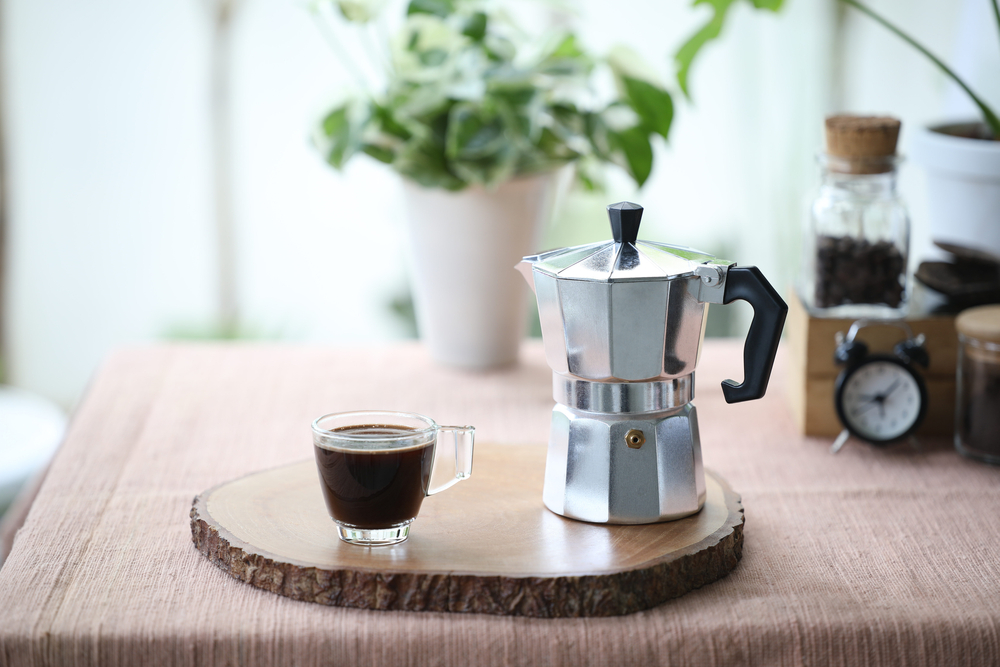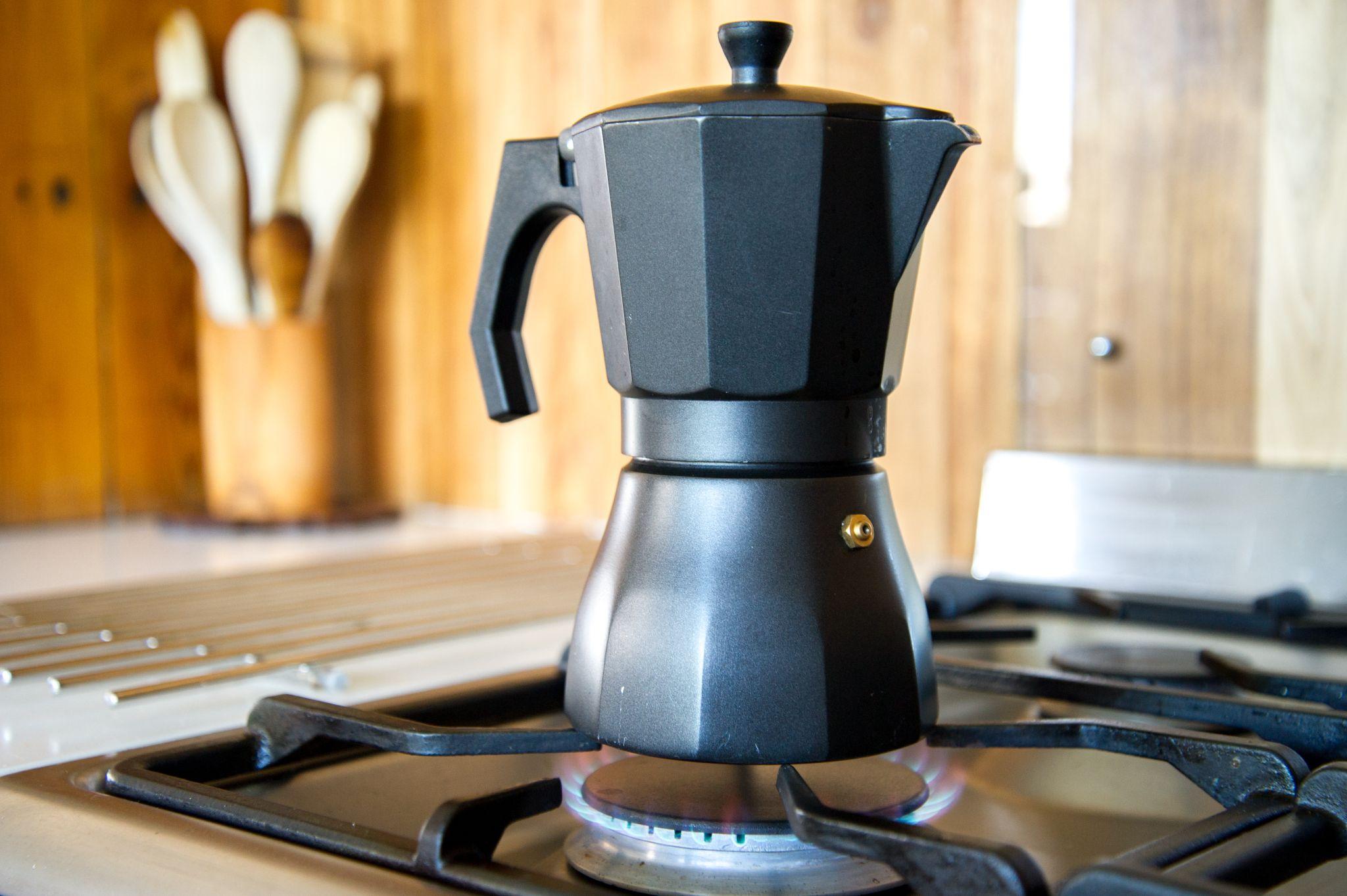Beginning the process of making life more sustainable and less toxic can be tricky. A lot of the work goes into understanding what is harmful, how to get rid of toxic materials in the home, and non-toxic alternatives.
Many everyday items, even the coffee pod used with a single serve coffee maker may be produced with toxic materials. It isn't always easy to find a non toxic coffee maker - or even a BPA free coffee maker.
For coffee lovers who also want to live a more sustainable life, this news is frustrating. However, they don’t have to give up their morning cold brew just yet. There are plenty of alternative non-toxic machines and coffee beans.

A Hot Cup of Espresso
But are there any non-toxic espresso machines? The simple answer is yes. There are several non-toxic options, including a standard drip coffee maker and Moka pot. Here’s a definitive guide on non-toxic coffee makers.
Many espresso machines have a lot of plastic parts. The big concern is if a plastic part of the coffee machine contains bisphenol A (BPA). This chemical has been linked to health and environmental issues.
Additionally, as espresso machines get more complex, they use more energy. Many modern coffee machines use on-demand hot water. While some have an automatic shut-off, most do not. Getting a timer requires additional resources, which may not be economically feasible.
These substantial energy requirements can be detrimental to the environment, contributing to climate change and pollution.
So, are there any non-toxic espresso machines that consume less energy and are BPA-free? Thankfully, there are many energy-efficient, plastic-free coffee makers. In addition to choosing BPA-free coffee maker alternatives, such as Moka pots and classic coffee percolators, opt for ethically-sourced, eco-friendly coffee beans.
An espresso maker can become full of bacteria, causing sickness. As with all kitchen appliances, an espresso machine can collect bacteria and grow mold if it doesn’t get cleaned frequently. Mold on old coffee grounds, a coffee pot, or coffee pods left in the machine can cause a host of health issues, including:
Relying on the hot water in the machine to clean isn’t sufficient. Aim to clean the main components every few days with soap and water and allow them to dry. Other parts can be cleaned every week or biweekly at most.
You may be able to place some components in the dishwasher. But, always read cleaning instructions to ensure the coffee machine doesn’t get damaged.
Are There Any Non-Toxic Espresso Machines? A non-toxic espresso machine is made from materials that aren’t toxic to the human body or the environment. These materials include stainless steel, glass, and BPA-free plastic.
Most coffee makers in the market have BPA plastic parts. Constant exposure to BPA can be detrimental to health. These chemicals can cause or exacerbate diseases, like cancer, autoimmune diseases, allergic reactions, and more.
BPA plastic has also been linked to various health issues, including:
Since the plastic in espresso machines isn’t biodegradable, it’s also toxic to the environment and contributes to waste, pollution, and harmful emissions.
Here are some of the best plastic free coffee maker alternatives.
The Moka pot is a stove-top or electric coffee maker that’s been around for centuries. Moka pots work by passing steam-pressurized boiling water through ground coffee beans. Stovetop Moka pot options give a vintage vibe and are easy to use.
Moka pots are almost always made from aluminum or stainless steel. These materials are non-toxic and eco-friendly.
Aluminum in Moka pots is an alloy of 6% magnesium and 94% aluminum that contains traces of silicon and iron. Stainless steel is made from iron and carbon, with additional chromium and nickel to give it shine and make it corrosion-resistant.
Most Moka pots in the market are made of aluminum. These tend to be more affordable compared to those made of stainless steel. Another advantage of aluminum Moka pots is their energy efficiency. Aluminum is lighter and conducts heat well, so less heat is needed to brew coffee. It’s also more malleable than stainless steel, meaning the Moka pots can come in various shapes.

Coffee Made with a Moka Pot
Stainless steel Moka pots can be pricey, but they last longer. They’re easy to maintain because they’re scratch and corrosion-resistant. Additionally, stainless steel is less reactive to food, so espresso brewed in a stainless steel Moka pot will retain its flavor and vibrancy. For those who love a sleek, vintage look, a stainless steel Moka pot is a fantastic sustainable option.
As more people move toward sustainability, Moka pots are making a comeback. There are many options on the market, and one can choose which one suits their budget and needs. Bialetti is a fantastic company to start with, as they have many available Moka pots and are world-renowned for their high quality.
2. French Press
A french press is a coffee maker that works by submerging ground coffee in hot water and then isolating the grounds from the coffee. This preparation is done by pressing down the filter. The French press is easy to use and requires little setup, making it convenient to put in an insulated flask for a quick cup of coffee on the go.
French presses are small and compact, making them the perfect option for those with less space or solo coffee drinkers. They can be stored almost anywhere and are quite durable.
Most French presses are made of glass, with the cylindrical plunger being made of stainless steel and the mesh from nylon. All of these materials are eco-friendly, long-lasting, and sustainable.
Some French presses are made of plastic. If one chooses to opt for the plastic version, ensure that it’s BPA-free. French presses are quite affordable, and there are many options online.
3. Classic Percolator
A coffee percolator is a classic way to get that espresso or drip coffee fix. It’s a coffee brewing pot that works by continually cycling the boiling brew through the grounds. The percolator uses gravity and high pressure to cycle the brew until it reaches perfect strength. A classic percolator uses gravity, and a Moka pot is a pressurized percolator. Percolators achieve perfect double-brewed coffee in one go, making them ideal for coffee enthusiasts.
Most classic Percolators are made from:
Stainless steel percolators are incredibly durable. They’re scratch-resistant and almost impossible to bend or damage. Another advantage is that they don’t rust, and they maintain the integrity of the coffee flavor and color.
Stainless steel remains the easiest material to clean and maintain. The shiny exterior will match well with more refined aesthetics. However, stainless steel percolators can be quite expensive.

A Stovetop Percolator
Enamel is a baked ceramic material. Classic Percolators made from enamel have a soft and delicate-looking finish. This finish makes them perfect for softer, more feminine aesthetics. They are also less expensive than stainless steel.
Due to the low heat conductivity of ceramic, enamel percolators will retain heat well. This retention makes them a fantastic option for those looking for a stove-top percolator. The main disadvantage of an enamel percolator is its fragility. While enamel is a sturdy material, it will break if dropped.
The safety of aluminum in coffee makers is a common concern among coffee lovers. But, research has shown that aluminum in coffee makers is safe, and there is negligible risk of ingesting harmful chemicals. This fact makes it safer than BPA-free plastic.
Aluminum percolators are a great budget option for espresso lovers. They heat water quickly and are extremely durable. Aluminum percolators are also lightweight, making them an excellent choice for large-capacity percolators.
4. BPA-Free and Stainless Steel Coffee Maker
If you’re set on using an espresso machine, there are a few less toxic options on the market. BPA-free coffee makers are becoming more popular. Most of their parts are made of stainless steel, and the plastic parts are made of BPA-free plastic. Mr. Coffee is a reliable brand that offers affordable BPA-free coffee makers.
Always read the product description when searching for a non-toxic coffee maker to ensure you won’t receive a product that has detrimental effects on your health and the environment.
The healthiest coffee maker will remain the percolator. The pressurized version, known as a Moka pot, and the classic version are great non-toxic coffee makers. Because they’re made from durable, non-toxic aluminum or stainless steel, they remain the best options on the market. They’re also eco-friendly since they last a lifetime if properly maintained.
While BPA-free coffee machines are less toxic than standard espresso machines, the percolator takes the cake for the healthiest coffee maker.
